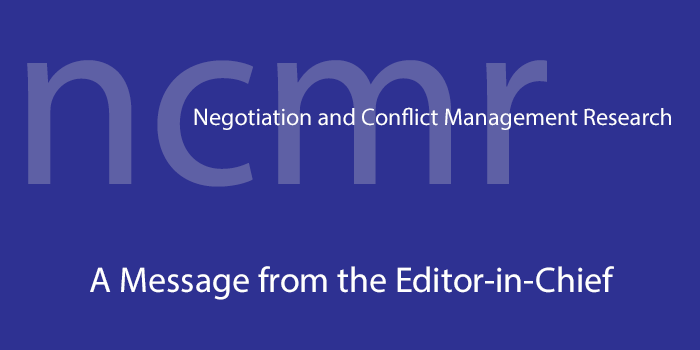SiGNAL (May 2022): Letter from NCMR EIC

Dear IACM Members,
I hope this letter finds you well. In this digest, I’m delighted to introduce to you our first two NCMR issues in 2022. Issue 15(1) (the February issue) and 15(2) (the May issue) contain five special issue articles and three regular issue articles. The special issue was edited by Dr. Lan Ni and focused on Negotiation and Conflict Management in Public Relations and Strategic Communication. Dr. Ni summarized the special issue articles as follows:
In response to the call for a special issue on “Negotiation and Conflict Management in Public Relations and Strategic Communication,” five articles were selected for publication. These articles ranged from empirical studies to conceptual pieces with case illustrations. A common theme was that public relations, as an academic discipline, can and should be connected to negotiation and conflict management to enhance both theory development and practical advance in how organizations manage and resolve conflicts with their publics. Some general frameworks for such integration were offered in Grunig’s (2022) overview of effective and ethical public relations and its role in helping manage conflicts as well as Huang and Cai’s (2022) integrative public relations model that connects two-way symmetrical communication with conflict resolution. At the same time, articles examined the nuances and dynamics in the context of conflict management, ranging from individual (Lee & Chon, 2022), organization (Pang & Cameron, 2022), and relationships (Cheng & Fisk, 2022).
The three regular issue articles are Julia A. Reif and Felix C. Brodbeck’s article, “Should I Negotiate?” A Model of Negotiation Initiation Considering Psychological Person-Environment Transactions; Marc Mertes, Jens Mazei, Corinna Gemmecke, and Joachim Hüffmeier’s article, Short-Term Effects of Authority Concessions to Terrorist Hostage-Takers: Stability and Generalizability of the Concession Effect; and Hee-Chan Song’s article, How Do Buddhist Monks Frame Conflicts? A Buddhist Approach to Paradox.
I would especially like to call your attention to the featured special issue article authored by Yi-Hui Christine Huang and Qinxian Cai and the regular issue article that was authored by Julia A. Reif and Felix C. Brodbeck. The highlights of the featured articles and all abstracts are included in this digest.
Please read, download, and share these articles via NCMR’s homepage: https://lps.library.cmu.edu/NCMR/
As always, feel free to send your feedback to me at ncmr@villanova.edu. Thank you and wish you and your loved ones peace and health.
Yours truly,
Qi
Dr. Qi Wang
Editor-in-Chief, NCMR
Special Issue: Negotiation and Conflict Management in Public Relations and Strategic Communication
Grunig, J. E. (2022). Negotiation and conflict management: Two valuable tools in the public relations toolbox. Negotiation and Conflict Management Research, 15(1), 1-5. https://lps.library.cmu.edu/NCMR/article/id/542/
Abstract: This introductory essay summarizes my research and theorizing over more than 50 years about the nature of public relations, how and why it is practiced in different ways, and how it can be practiced most effectively and ethically. I have concluded that public relations will be most ethical and have the most value for publics, organizations, and society when the function is involved in the strategic management processes of organizations and is practiced with a symmetrical approach rather than a purely asymmetrical approach. Some scholars have criticized this approach, and I discuss and respond to their critiques. The essay also addresses the role of negotiation and conflict management in public relations and explains how public relations can help manage organization-public conflict by steering organizations toward a symmetrical resolution of conflicts and away from the conflicts that eventually occur when organizations engage in one-way, asymmetrical, and unethical communication strategies.
Lee, Y., & Chon, M.-G. (2022). “Don’t go, don’t buy”: Understanding the motivations of the anti-Japan boycott movement in South Korea during an international conflict. Negotiation and Conflict Management Research, 15(1), 6-31. https://doi.org/10.34891/zjpg-xg89
Abstract: Using the case of the 2019 boycott of Japanese products in South Korea, this study aims to investigate how consumers are motivated to participate in a national boycott movement during an international conflict via a theoretical model. Drawing insights from conflict management, consumer behavior, and public relations literature, this study identified key predictors of consumer animosity, which motivated Korean publics to engage in negative peer communication and boycott Japanese products and services. The results of an online survey revealed that Korean consumers’ patriotism, susceptibility to normative influence, and perceived quality of relationship with the foreign (Japanese) government significantly increased their animosity toward the country, Japan. Consumer animosity played an important role in publics’ conflict management strategies, including activeness in negative communication with their peers about Japan and Japanese products and intentions to participate in the national boycott movement. Theoretical and practical implications are discussed.
Cheng, Y., & Fisk, A. (2022). Toward a contingency theory of relating management: Exploring organization-public relationships (OPRs) in conflicts. Negotiation and Conflict Management Research, 15(1), 32-51. https://lps.library.cmu.edu/NCMR/article/id/523/
Abstract: This paper presents the theoretical rationale for a contingency theory of relating management. The purpose of building such a contingency approach is to assist organizations in assessing and managing the dynamics of relationships with their external and internal publics when conflicts arise. Through integrating interdisciplinary literature from public relations and conflict management, this theoretical framework argues that contingent organization-public relationships (COPRs) in the conflict management process are highly dynamic and complex. COPRs influence relationship qualities and depend on three main categories of antecedents, including predisposing, situational, and contextual elements. An up-to-date case about conflicts between Johnson & Johnson and its baby powder consumers was analyzed to illustrate propositions from the postulated theory. Implications of this article help to move public relations theory beyond static and microlevel measurements of relationships and add value to the conflict theory literature, which mainly focuses on intra-organizational or interpersonal conflicts.
Pang, A., & Cameron, G. T. (2022). Conflict positioning in crisis communication: Impact of antecedent conditions on negotiation. Negotiation and Conflict Management Research, 15(1), 52-77. https://lps.library.cmu.edu/NCMR/article/id/543/
Abstract: Organizations need to position themselves favorably in times of crisis. The conflict positioning conceptualization offers a framework for organizations to do so by integrating insights of crisis communication with negotiation through the following steps. First, understanding the factors that will affect an organization’s ability to handle the crisis. Second, based on the influence of these factors, examine the stance the organization will adopt. Third, examine the strategies the organization will embrace. Four, the strategies adopted will impact the conflict property it aims to resolve which will in turn influence the negotiation approach and the relationship dynamics between the organization and its publics. Last but not least, how these will impact the tactics enacted. Ten propositions, based on examination of five a priori factors which have also been validated in other studies, are examined. This is followed by application of how conflict positioning can occur in two real-life cases. This framework offers practical applications and theoretical implications.
Featured Special Issue Article
Huang, Y.-H. C., & Cai, Q. (2022). Negotiating disciplines: A model of integrative public relations from a conflict-resolution perspective. Negotiation and Conflict Management Research, 15(2). https://lps.library.cmu.edu/NCMR/article/id/581/
Abstract: This paper investigates potential cross-fertilizations of public relations and conflict management. We first address criticisms of the two-way symmetrical communication model and Excellence theory in the field of public relations in order to highlight how concepts borrowed from negotiation and conflict management scholarship can remedy those concerns. Ultimately, we theorize an integrative public relations model that outlines a conflict-resolution perspective of public relations. Multiple scenarios and contexts in which this model might be applied include: contexts where high value is placed on long-term relationships; processes characterized by repeated, serial exchanges of information and communications between contending parties; conflict scenarios characterized by multiple issues entangled in strongly complex ways; situations where minimal power asymmetry exists between an organization and its publics; contexts characterized by openness to information sharing and exchange; and contexts where a high importance is placed on trust. Finally, a case illustrates how integrative public relations can be leveraged. We conclude with our model’s implications for public relations and conflict management.
Highlights:
- Negotiation/conflict management and public relations could cross-fertilize each other. We advanced the traditional public relations model to theorize “integrative public relations” from the perspective of negotiation/conflict management in general and integrative negotiation in particular.
- We proposed integrative public relations model to remedy the concerns of two-way symmetrical communication and excellence theory. Specifically, four propositions from conflict orientation, negotiation principle, feasibility and practicality, as well as utility and effectiveness were developed to explicate the extent to which integrative public relations are practical, effective, and sustainable.
- We also discussed contingencies for integrative public relations model. Scenarios that present multiple avenues for value creation are defined by the following features: value placed on long-term relationships; repeated, serial exchanges of information between contending parties; complex entanglement of multiple issues; minimal power asymmetry; openness to information sharing and exchange; and a high importance placed on trust.
- Integrative public relations stands out its unique contribution to the scholarships of negotiation/conflict management and public relations by providing practical guidelines (i.e., seven-element framework) to negotiate win-win agreements.
Authors:
 Yi-Hui Christine Huang, ICA (International Communication Association) Fellow, is Chair Professor of Communication and Media at City University of Hong Kong and Emeritus Professor of The Chinese University of Hong Kong. She has long been committed to research on strategic communication, risk communication in health and technology, crisis communication, relationship management, and cross-cultural communication. She served as Senior Associate Editor for Journal of Public Relations Research from 2020 to 2022. She currently serves as Editor for Communication and the Public (ESCI) and Communication and Society (TSSCI). Moreover, she serves as Founding Editorial Board Member for Journal of International Crisis and Risk Communication. She also serves as an editorial board member for more than 10 major international SSCI journals, such as Journal of Communication and Public Relations Review. She has received multiple international research awards and recognition for originality, quality, and productivity, including 37 Top Papers and other commendations for research. In the past 10 years, Prof. Huang has delivered 21 international keynotes in the USA, Austria, Australia, Korea, Mainland China, Hong Kong, and Taiwan, showing the broad reach and social impact of her works. In addition to keynotes, she has also given more than 100 invited presentations at scholarly and professional meetings and workshops.
Yi-Hui Christine Huang, ICA (International Communication Association) Fellow, is Chair Professor of Communication and Media at City University of Hong Kong and Emeritus Professor of The Chinese University of Hong Kong. She has long been committed to research on strategic communication, risk communication in health and technology, crisis communication, relationship management, and cross-cultural communication. She served as Senior Associate Editor for Journal of Public Relations Research from 2020 to 2022. She currently serves as Editor for Communication and the Public (ESCI) and Communication and Society (TSSCI). Moreover, she serves as Founding Editorial Board Member for Journal of International Crisis and Risk Communication. She also serves as an editorial board member for more than 10 major international SSCI journals, such as Journal of Communication and Public Relations Review. She has received multiple international research awards and recognition for originality, quality, and productivity, including 37 Top Papers and other commendations for research. In the past 10 years, Prof. Huang has delivered 21 international keynotes in the USA, Austria, Australia, Korea, Mainland China, Hong Kong, and Taiwan, showing the broad reach and social impact of her works. In addition to keynotes, she has also given more than 100 invited presentations at scholarly and professional meetings and workshops.
Contact: yihhuang@cityu.edu.hk
Web: https://scholars.cityu.edu.hk/en/persons/yihui-huang(4b4d1477-5571-419e-95bc-34d580ef9b98).html
 Qinxian Cai is a Ph.D. Student at the Department of Media and Communication, City University of Hong Kong. His research interests include strategic communication, crisis management, risk and health communication.
Qinxian Cai is a Ph.D. Student at the Department of Media and Communication, City University of Hong Kong. His research interests include strategic communication, crisis management, risk and health communication.
Contact: cenric97@gmail.com
Web: https://scholars.cityu.edu.hk/en/persons/qinxian-cai(61074e6d-3866-4ccf-a413-63142af91ac0).html
Regular Issue Articles 15(2)
Mertes, M., Mazei, J., Gemmecke, C., & Hüffmeier, J. (2022). Short-term effects of authority concessions to terrorist hostage-takers: stability and generalizability of the concession effect. Negotiation and Conflict Management Research, 15(2). https://lps.library.cmu.edu/NCMR/article/id/533/
Abstract: Should authorities concede to the demands of terrorist hostage-takers or not? Making this difficult decision requires accurate knowledge of the consequences of each alternative. A prior study suggested that authority concessions to terrorist hostage-takers reduce casualties among the hostages and overall (Mertes et al., 2020). We term this finding the concession effect. However, this previous study investigated relatively old data on exclusively international terrorist hostage takings. Outdated findings could impair decision-making in life–threatening situations. Thus, we illuminate the stability and generalizability of the concession effect. We analyzed Global Terrorism Database (START, 2019b) data on domestic terrorist hostage-takings that occurred between 1970 and 2018. As hypothesized, we found that authority concessions increased the likelihood of a successfully completed hostage exchange and reduced the number of overall fatalities. Altogether, our findings suggest that the concession effect is a stable phenomenon that generalizes to domestic terrorist hostage-takings.
Song, H. C. (2022). How do Buddhist monks frame conflicts? A Buddhist approach to paradox. Negotiation and Conflict Management Research, 15(2). https://lps.library.cmu.edu/NCMR/article/id/423/
Abstract: Paradox theory proposes that some conflicts need not be mitigated or eliminated because conflicts can help people create synergy. In organizational studies, the concept of a paradox is typically theorized as a unique response to conflicts. Such a conceptualization allows organizational scholars to investigate how a paradox is manifested in one’s decision-making. Deviating from the existing literature, this study develops an alternative approach to a paradox, particularly from a Buddhist perspective. To this end, I conducted a three-month ethnographic fieldwork in a Korean Buddhist temple that allowed me to investigate how Buddhist monks frame conflicts, dualities, and tensions that are central to Buddhist philosophy. While living and working closely with Buddhist monks, I found that the monks try to make sense of conflicts by deconstructing cognitive boundaries between opposing elements of conflicts, which, they believe, unconsciously cause tension in their minds. By theorizing this Buddhist perspective, this study contributes to individual-level paradox research.
Featured Regular Issue Article
Reif, J. A. M., & Brodbeck, F. C. (2021). “Should I Negotiate?” A model of negotiation initiation considering psychological person-environment transactions. Negotiation and Conflict Management Research, 15(2). https://lps.library.cmu.edu/NCMR/article/id/524/
Summary and Highlights
Organizations are offering employees increasing opportunities to individually negotiate the terms of their employment. If employees want to take advantage of these opportunities, they have to initiate negotiations, often with their supervisors.
In this paper, we qualitatively investigated what employees negotiate about in organizational contexts and how their initiative behaviour in negotiation situations can be explained and described. Building on existing theory, we examined how cybernetic, cognitive-motivational, relational and situational factors interact in forming employees’ decisions whether or not to negotiate.
Using a combined deductive and inductive approach, we identified contents and processes that facilitated or inhibited negotiation initiation, while considering the complex transactions between the negotiator and his/her environment.
In line with the model of negotiation initiation (Reif & Brodbeck, 2014), employees initiated negotiations when they perceived negative discrepancies (e.g., too low salary, poor working environment) and negative activating affect (e.g., dissatisfaction, anger). Discrepancy and affect were weighed against cognitive considerations of valence (How important is it to me?), instrumentality (What’s in it for me?), and expectancy (Am I able to do that?). Employees did not initiate negotiations if they perceived no discrepancies or no negative affect, or if the activating effects of negative discrepancy and negative affect were buffered by negative instrumentality, no expectancy, or low valence, which underpins existing theoretical assumptions.
However, going beyond existing research, we also found the following:
- Cognitive considerations of valence, instrumentality, and expectancy also directly influenced people’s decisions to negotiate and did not only function as moderators, as formerly proposed.
- Besides cybernetic and cognitive-motivational elements, we identified further contextual, direct influences on negotiation initiations, that is, the negotiation situation, the negotiation partner, as well as the negotiator’s states and dispositions.
- In addition to their direct effects, these contextual factors (negotiation partner, negotiation situation, negotiator) also had an indirect effect on negotiation initiation by shaping expectancy and instrumentality considerations.
- The resulting transactional model of negotiation initiation shows how individual cognitive considerations are formed by specific contextual influences and further clarifies the role of dispositions in the initiation process of negotiation.
Authors:
 Felix C. Brodbeck is Chair of Economic and Organisational Psychology at Ludwig-Maximilians-Universitaet Muenchen, Munich. His research interests include leadership and teamwork in organizations, economic decision-making, and cross-cultural psychology.
Felix C. Brodbeck is Chair of Economic and Organisational Psychology at Ludwig-Maximilians-Universitaet Muenchen, Munich. His research interests include leadership and teamwork in organizations, economic decision-making, and cross-cultural psychology.

Julia A. M. Reif is Professor of Economic and Organisational Psychology at the Universitaet der Bundeswehr Muenchen, Neubiberg. She was a postdoctoral scientific staff member and lecturer of Economic and Organisational Psychology at the Ludwig-Maximilians-Universitaet Muenchen, Munich until 2021. Her research interests include the initiation of negotiation, team processes, stress management, and organizational acculturation.
